New Spotlight Theatre Teacher Boasts Varied, Impressive Background
The newest children’s theater instructor at Moline’s Spotlight Theatre has traveled far and wide to pursue her passions – theater and history.
Lily Maynard – a friendly 34-year-old who’s married to Quad City Arts executive director Kevin Maynard – grew up in Anchorage, Alaska. She earned her BFA in musical theater in 2011 and a master’s in history, both from Western Illinois University.
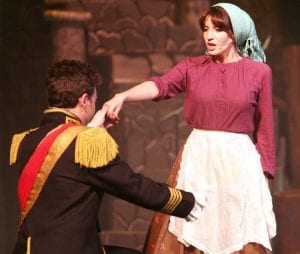
Lily as Cinderella in the musical “Into the Woods.”
Since her first appearance on stage in a Florida high school production of Stand and Deliver (1999), Lily has appeared in more than 50 productions — including Guys and Dolls, You’re A Good Man Charlie Brown, Educating Rita, Little Shop of Horrors, and August: Osage County.
Her favorite roles include Woman 1 in I Love You, You’re Perfect Now Change and Props Mistress Quickly in The Complete Works of William Shakespeare (Abridged), which she performed in Shanghai and Beijing, China in 2010. Lily has worked as a theatre and dance educator for over 15 years, specializing in theatre for young audiences, movement for the stage, stage combat, and directing.
She’s a certified stage combat instructor with Dueling Arts International, and is recognized as an advanced actor combatant with the Society of American Fight Directors, and is an active member of the National Dance Education Organization.
A freelance choreographer, Lily has always loved to dance, and as an undergrad was a teaching assistant for tap class, for two and a half years.
She was on her university dance team, and hosted a clinic for students. “I had a lot of fun doing that,” Lily said in a recent interview. “I like putting pictures together; I like telling stories. I like telling story through movement and I keep coming back to that characterization – why we fight, why we dance.”
“I love doing those things and I just feel alive when I get to do those things and I want to share that with others,” she said. “Dancing especially is great, because anybody can do it. It is utterly human.”
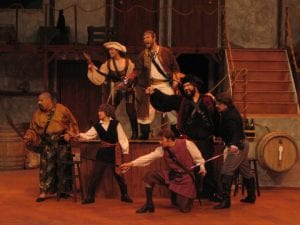
Lily (upper left) as Irish pirate Anne Bonney.
Born in Hollywood, Fla., Lily has five older brothers and she and her family moved to Alaska when she was 4, for her father’s job as an assistant pastor. It was supposed to be for two years and he’s still there today, Lily said.
After being in several high school shows at an Anchorage magnet school, she got her first lead outside of school (as a professional) in a production about pirates. “There was a lot of sword-fighting in the show and they brought in a stage-combat instructor to teach some basics,” Lily recalled.
“That was a totally new experience for me. It was amazing and I want to do it all the time,” she said. “So I started doing work at a Renaissance festival and got involved in a fight show. I wasn’t really convinced I was going to go to college.”
Maynard signed up for a historical broad-sword workshop in Anchorage taught by D.C. Wright, head of movement and stage combat at Western Illinois University, Macomb. He said she had a knack for it and recommended Western for college, after Lily worked for two years

D.C. Wright is head of movement and stage combat at Western Illinois University, Macomb.
following high school.
“When I went, Western had the largest stage-combat arsenal (weapons) in the nation,” she said. “I think currently, it’s one of three or four universities that have an actual minor in stage combat. It didn’t when I was there; it does now.”
Maynard said WIU had only started a bachelor’s program in musical theater then, which had a lot of energy. “It felt like where I should be; it felt like home,” she said.
A whole new world at Western
Western launched a minor in stage combat in fall 2018, at the time just the second university in the U.S. to have one; Columbia College in Chicago also did then.
Before graduating at WIU, Lily became an advanced actor combatant and accepted into associate instructor training with Dueling Arts
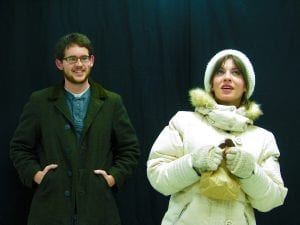
Lily and Kevin in a Western Illinois University production of “Almost, Maine.”
International (which does stage combat training). She got that certification in 2010.
“I really felt cool, for one,” she said of stage combat, often part of Shakespeare plays. “I have five older brothers, so I was picked on a lot as a girl. I just always wanted to be tough and one of the guys. So, I was very much a tomboy growing up. I liked playing in the dirt and rough-housing. A lot of that was because I wanted to spend time with my brothers.
“I was always into action films,” she said. “It’s cool. If you’ve never done it, if you get a chance to play with a sword, you feel really cool. So there was that aspect of it – living out these ‘Treasure Island’ or ‘Peter Pan’ childhood fantasies of swordplay.”
Maynard said the great thing about WIU’s program is, stage combat is integrated into the curriculum.
“It’s not, here’s acting and here’s this other thing that you do,” she said. “It really focused on telling the story and emphasizing the fight happens for a reason. People fight specific ways for a reason and in certain contexts. That is what fascinated me the most. And it’s really fun.”
Shakespeare also was a big part of the theater program, Maynard said. “Being able to serve as an assistant fight director, and see how people craft those stories on stage, getting to do that dramaturgical work – where I come in and say, you can use the sword this way. This is how they would have done it.”
D.C. Wright (who’s taught at WIU since 2002) said stage combat was very rare in schools until the early 2000s, and it definitely started as a boys’ club.
“When I first started, there wasn’t enough clamor for it. There has been growing desire for that thing; a lot of people are really interested in it now,” he said Tuesday, noting Lily did a lot of training in stage combat, including to become a teacher.
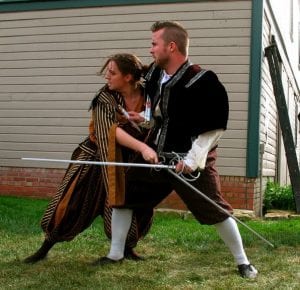
Lily played Benvolio in an “unrehearsed” production of Shakespeare’s “Romeo and Juliet.”
“Lily was always very physically gifted, and learned quickly,” Wright said. “She came with natural ability, talents, to be able to move well.”
In recent years, more women are into the field, even though the standard roles in Shakespeare that feature combat are male.
“A lot of professional theaters are doing more gender-blind casting, to make sure women get roles,” Wright said. “There has been a glut of women taking classes and getting really good at it. Use it and let women be the badass. In current contemporary plays, women are in violent situations – with a lot of domestic abuse, one of the participants is a woman. It’s not always weapon work.
“Women definitely need stage combat, being unarmed,” he said. “They’re going to have to get pushed, fall down, even if it’s not necessarily a fight.”
Wright taught Maynard for the stage combat teaching workshop, and that takes special skill as well – since being a good performer doesn’t guarantee you’ll be a good teacher, he said.
“She made that shift pretty well in two weeks,” he said. “She very successfully flipped that switch; she had a great teacher persona there. She definitely had skills.”
In her teacher training for stage combat, there were just four women and 20 men, Maynard noted. “That’s pretty representative of the field as a whole. You’re seeing more women come into that. There’s more fight directors, teachers and fighters now who are women.”
She wasn’t intimidated by being in the minority.

The former Lily Blouin is married to Quad City Arts executive director Kevin Maynard.
“It was empowering, and I don’t know if that was because I was fortunate to partner with a strong female fighter, so I felt like I had someone to look up to,” she said. “We always got to kick ass. The fight directors and my teachers never like pushed into what felt like a feminine role. It was very much like, you’re gonna win every fight and you’re gonna do it in a vicious, uncharacteristically feminine way.”
There were very few instances where her choreography suggested she should be intimidated, Maynard said.
“It also helped, too, by the time I was in school, I was already doing stage combat for three years and I had been doing it pretty regularly,” she said. “I maybe had an advantage because I was being called on in class to help demonstrate things. I was empowered early on to be a leader in that field and feel confident in my skill set.”
History as “nerdy hobby”
When deciding whether to pursue a master’s in history or theater, Maynard chose the former, earning a full assistantship, calling history her “nerdy hobby.”
“I call it my backup, but I’m not sure how safe a backup it is,” she joked.
History and theater intersect a lot, and that’s partly why Maynard chose history for her master’s.
“It was kind of the story of my life – that sounds fun, so I applied and got accepted,” she laughed. “I really thought I was going to teach. I think I saw more opportunities to teach that way. I knew I wanted to study history more in-depth and hone that skill.”

Lily performing as the title role in “Mary Poppins.”
Somewhere down the road, she may get a PhD in dramaturgy (the craft or technique of dramatic composition, exploring the world of a play).
Maynard got interested in history in high school, where she had a lot of flexibility in what to study. A three-week intensive counted for an entire semester, and one year she did a World War I history intensive.
“There was an assignment where we had to journal every day, as if we were experiencing things we learned about in the course,” she recalled. “I didn’t know history could be like that. I got completely fascinated. I was really fascinated by war; what I studied mainly in grad school was the American Revolution and the Roman republic.”
Maynard has been fascinated by conflict and what drives people, she said. “That’s probably why combat was so appealing to me, because I already started to kind of dive into warfare and history, so those things were converging all at once.”
“I was like, I can act these things out on stage? People will pay me to do this? Cool,” Maynard said. “Let’s do it!”
She acted in China during her senior year at WIU, through a professor who ran a theater company in Macomb. It happened independent of school, but she got credits toward her degree. They performed the rapid-fire “Complete Works of Shakespeare (Abridged)” at Western and were invited to the Shanghai Comedy Festival and Beijing Comedy Festival.
“It was an experiment in physical comedy,” Maynard said. “The university was curious how it would translate. That show is mostly slapstick, lowbrow comedy. It was just a really fun time, and an unbelievable experience. We spent two weeks in Beijing and one week in Shanghai, performing it at various places, and we got to take classes at the university.”
“It was just really an unreal experience,” she said. “The audiences laughed. We worked with the university prior and they built these LED marquees on the side of the theater that were translating in real time.”
“Many of the students already spoke impeccable English,” Maynard said.
Combining history and theater in work
Formerly the head of Prairie Players Civic Theatre’s Youth Summer Theatre program, Maynard works as a freelance choreographer throughout west central Illinois and currently serves as co-director of the Community Play Project, an inclusive theatre company in Galesburg.
They mainly work with adults who have mental and physical disabilities, and challenge the notion “that theater has to look or be a certain
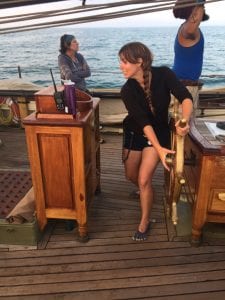
Lily working to steer the Tall Ship Lynx, which sails along the East Coast.
way, or requires certain abilities,” Maynard said. “We work to put on a show every year, but unfortunately that group has been really hard hit by the coronavirus.”
“They’re not even congregating within their own homes and professional activities, so it’s been really hard for us to try and adapt and connect with them at this time,” she said. “We’re on a little bit of a hiatus, but hopefully we’ll be coming back, realistically late summer or fall.”
The Community Play Project did “Shrek the Musical” in fall 2019 at Prairie Players Civic Theatre, the home of the project, Maynard said.
She headed the Youth Summer Theatre program from 2013 to 2015. “There’s a lot of theater talent in that area,” she said. “There’s a lot of kids who are coming up in theater, so really wanting to reach the older kids and give them a little more focus, and more of a challenge.”
Maynard stopped doing that because she was offered a job on a tall ship, sailing up and down the East Coast, as a docent. She lived on that ship for eight months (through spring 2016), teaching people about the War of 1812.
Tall Ship Lynx is a replica of an actual privateer (wooden sailing ship) built in 1812. It’s an educational organization, dedicated to hands-on education. The ship hails from the historic island of Nantucket, Mass.; it’s owned and operated by the Lynx Educational Foundation.
Maynard had previously worked on a tall ship in Chicago as a pirate for a summer, teaching about Great Lakes piracy. Through one of her classmates at WIU, she booked that gig and six years later, that same person was working on Tall Ship Lynx, and posted a photo of Nantucket in the summer, saying they were looking for docents for history tours.
“I wasn’t really working at the time; I was working with Prairie Players and I was bartending,” Maynard said. “We were still relatively new in Galesburg. I jokingly replied, yeah, I’d love to do it and he called me 30 minutes later. Within a week, I was on the ship.”
“It was really fun,” she said. “They teach about traditional sailing techniques. So, when it gets winter up north, the ship starts slowly making

Lillian Maynard, who grew up in Alaska, earned her bachelor’s and master’s from Western Illinois University.
its way down the coast. That’s where I got on…Eventually, it came down around Florida; we spent about two months in St. Petersburg, docked there, doing day sails and we made our way back up.”
She applied to work at the National Railroad Hall of Fame in Galesburg while she was on the ship in Florida.
The Congress formally recognized the Railroad Hall of Fame through a U.S. House resolution passed in October 2003, and then the Senate in April 2004. Induction to the Hall of Fame occurs annually.
Galesburg “has long served as a nexus for the North American railroad,” according to the architectural firm Skidmore, Owings & Merrill, which has designed a planned National Railroad Hall of Fame Museum. “Located at the crossroads of two major intercontinental railway lines and home to one of the largest rail yards in the United States, the city has played a significant role in American locomotive history. The new 30,000-square-foot museum “will celebrate the longstanding history of the American railroad industry while establishing a permanent home for the newly created institution.”
“Galesburg has a really rich railroad history,” Maynard said, noting the city connects to all major railroad companies, which pass through it. The first settlers of the area were railroad builders, she noted.
The Hall of Fame mission is to inspire people and educate them on the importance of railroads, she said. “The story of Illinois is the story of the railroad,” Maynard said. “It’s been in a capital campaign period for a long time.”

Lily and Kevin Maynard’s 2015 wedding had a “Peter Pan” green color theme.
The museum project may cost up to $40 million, she said.
Maynard worked as director of education and outreach for the Railroad Hall from 2016 to 2018, and also for the Association of Private Railroad Car Owners, both based in the same office. She’s now a nonprofit consultant for Forefront – a statewide association to support nonprofits in Illinois.
Maynard is the west-central Illinois regional coordinator, provide programming including nonprofit governance, fundraising, and best practices. “We try to bring people together; we’re a convener,” she said, noting she focuses in Knox and Warren counties and hopes to eventually expand into the Quad-Cities.
Maynard’s office is shared with the Warren County United Way in Monmouth, and has been working remotely during the pandemic. She works with up to 50 organizations that are Forefront members (there are 1,100 statewide), and 25 others that are part of their programs.
Kevin Maynard was the executive director of Galesburg’s Orpheum Theatre, before coming to head Quad City Arts in December 2018. He has done acting as well, and the couple performed in “Almost, Maine” together while at Western.
Finding a new Spotlight in Moline
Lily will be working with both Spotlight Theatre’s S.K.I.T. program (grades K-2) and the “Peter Pan, Jr.” show (grades 3-8), the latter

Bethany Sanders is another new Spotlight children’s theater instructor.
beginning rehearsals later this month. She’ll music direct “Peter Pan”; it’s one of her favorite shows, and she and Kevin had a Peter Pan-themed wedding in 2015).
Lily was cast as Jane in the Spotlight’s “Tarzan” in 2020, which was postponed with the rest of the theater’s mainstage season.
“She’s fantastic; she’s going to be just a wonderful asset to the Quad-Cities theater scene,” Spotlight co-owner Sara Tubbs said. “She’s a very talented person, super friendly. We’re super excited.”
Lily first came to the Spotlight to see “Billy Elliot” in fall 2019.
“It was truly spectacular,” she said Wednesday. “I was so impressed — it had all the quality of a professional production but the heart and energy of a community theatre. It reminded me of my community theatre back home, so I decided to learn more. I looked for opportunities

The Spotlight Theatre is at 1800 7th Ave., Moline.
to get involved. I went to a Tap masterclass because as a tap teacher I don’t often get to take a class, and I decided to audition for their upcoming production of ‘Tarzan.’
“I honestly didn’t think I would get cast, nobody really knew who I was…so imagine my surprise when I got cast as Jane,” Lily said. “The relationship just kept growing after that. The world fell apart before rehearsals even began, and it has been devastating for the arts community, but Brent and Sara were constantly looking for safe ways to create — to keep theatre alive in the community.”
She performed in Spotlight’s Disney cabaret and has felt very welcome at the theater at 1800 7th Ave., Moline.
“Sara, Brent and the whole company really have just been so friendly and inviting since my audition,” Lily said. “They just opened their arms and said ‘Welcome to the family’ and before you know it, we’re talking about future shows and commiserating about all that’s been lost and how we can keep moving forward and eventually that turned to discussions about classes and my background in youth theatre and theatre education.”
“I’m really looking forward to creating and playing,” she said of teaching. “The age group I get to work with for SKIT is such a fun group to do theatre with because their imaginations are still really big, and wildly, and they’re still figuring the world out, so they have a really unique perspective. Plus, they haven’t reached that age where they’re too cool to play. It’s a very inspiring and fun age group.”
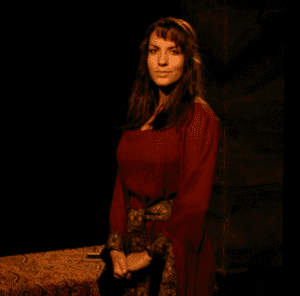
Lily Maynard of Rock Island is the newest children’s theater instructor for Spotlight Theatre in Moline.
Lily said she’s especially stoked to work with Bethany Sanders. “Our backgrounds are very similar and I think we’re going to make a great team. I’m especially excited to be working on a show like ‘Lemonade.’ It’s not a well-known show, but the characters are familiar,” Lily said.
“Familiarity makes it easier for kids to step into those roles, but the best part about the show is that the show explores how to make the best of a situation that didn’t quite go as planned, and that’s something we’re ALL dealing with,” she said by e-mail.
“So in addition to teaching kids how to work together, how to speak in public, how to follow directions, we’re also learning about problem-solving and empathy. We get to role play situations and solutions that can actually be applied in their lives,” Lily said. “That’s what’s so great about theatre — it allows us to see the world through different perspectives, to literally walk in another person’s shoes, and imagine a different future for ourselves and each other.
“It may just look like PLAY on the outside, but theatre teaches us how to be better humans,” she added. “Also, sword fighting!”









